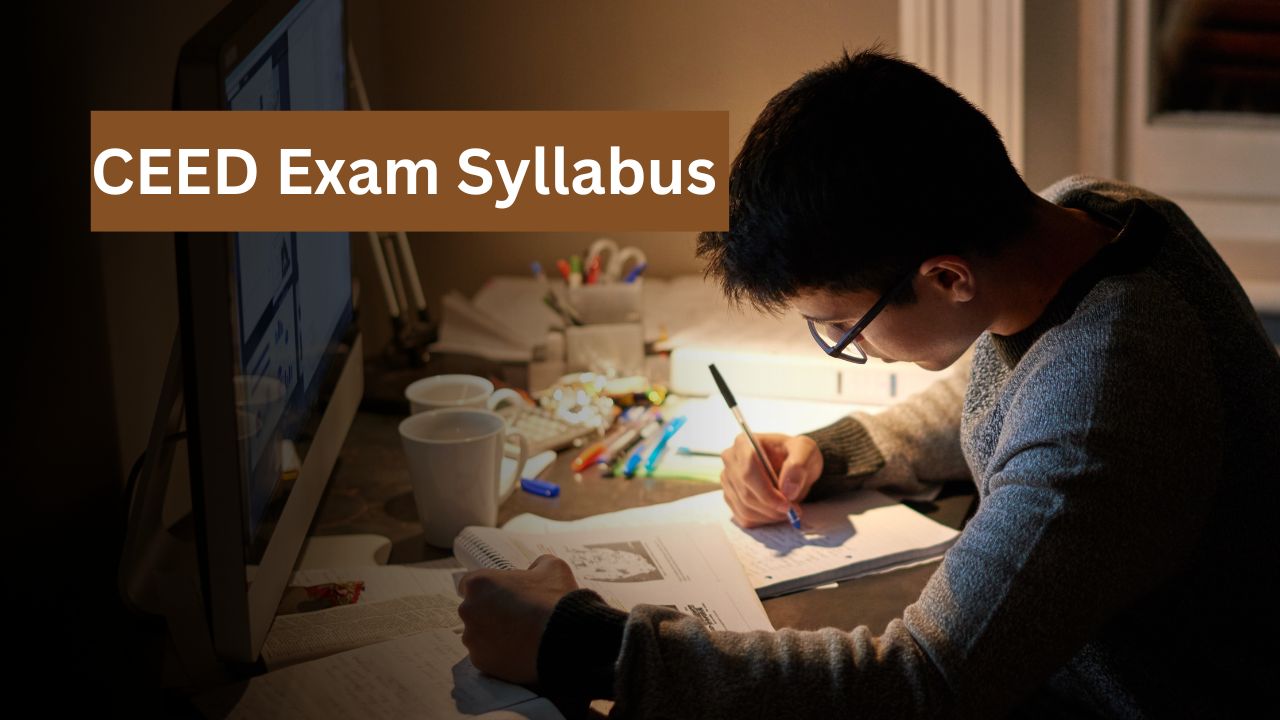CEED Exam Syllabus
What is CEED?
The Common Entrance Exam for Design (CEED) is to assess the candidate’s aptitude for design involving visual perception ability, drawing skills, logical reasoning, creativity, communication, and Problem-solving skills.
CEED Exam Pattern
- CEED is conducted by IIT Bombay.
- It is a qualifying examination for admission to Master of Design (MDes) programs.
- Qualified students can take admission at IISc Bangalore, IIT Bombay, IIT Delhi, IIT Guwahati, IIT Hyderabad, IIT Jodhpur, IIT Kanpur, IIT Roorkee, IIITDM Jabalpur, IIITDM Kancheepuram and PhD programs at several IITs and design schools as per their rank in CEED.
- Qualifying in CEED alone does not guarantee admission to any of these programs.
- Admitting institutes may conduct further tests and/or interviews for the final selection/admission. A CEED score does NOT guarantee admission.
- Admitting institutes will also verify the eligibility, category certificates and other documents along with the CEED score.
- The CEED 2024 score is valid for one year from the date of declaration of the result.
CEED Exam Syllabus
CEED exam Syllabus contains two parts that is Part A and Part B. Here is the detailed syllabus of CEED exam 2025.
CEED Exam Syllabus Part-A
- Visualization and spatial reasoning: Ability to visualize and transform 2D shapes and 3D objects and their spatial relationships.
- Practical and scientific knowledge: Know-how of scientific principles and everyday objects.
- Observation and design sensitivity: The capacity to detect concealed properties in daily life and think critically about them. Attention to detail, classification, analysis, inference and prediction.
- Environment and society: General awareness of environmental, social and cultural connections with design.
- Analytical and logical reasoning: Ability to analyze qualitative and quantitative information
- Language: Proficiency in reading and comprehending Standard English.
- Creativity: Grasp of verbal and non-verbal analogies, metaphors, signs and symbols.
- Art and Design knowledge: Awareness about art/artifact/product, artists/designers, art/design history and trends.
- Design methods and practices: Knowledge of media, materials, production processes, and ergonomics.
CEED Exam Syllabus Part-B
- Drawing: Ability to draw products, people or scenes in proportion with good line quality, composition, proportion, perspective, and shading.
- Creativity: Ability to think out-of-the-box and come-up with unique as well as diverse solutions.
- Communication: Skills to communicate concepts and ideas clearly with the help of text and visuals.
- Problem identification: Skills to understand the user and the context, knowledge of properties of materials and their appropriate use in design.
- CEED 2024 was an aptitude test; hence, no specific textbook or guide is recommended for its preparation. Candidates may, however, practice their drawing, rendering and visualization skills.
If you are preparing for OPSC ASO examination 2025, click here for the detailed OPSC ASO Syllabus.
CEED Exam Detail
This examination will consist of two parts like Part-1 and Part-2. Candidates must attempt questions from both the parts.
CEED Part-1 Exam
- CEED Part-1 Exam will be conducted from 9:00 am to 10:00 am.
- Part-1exam has total marks of 150 and Maximum time of the exam is 1 hour.
CEED exam Part -1 exam consist of three sections:
| Section-1 | Section 1 is Numerical Answer Type examination popularly known as NAT. NAT asks total 8 questions consists of 4 marks each. There is no negative marking in NAT. For these questions, the answer is a number that needs to be entered using a virtual keyboard on the computer screen. No choices will be shown for these questions. |
| Section-2 | Section 2 – consists of 10 Multiple Choice Questions(MCQ). Each MCQ may have one or more than one correct choices out of the given four options. The marking scheme of the exam: Full Marks: + 4 If only all the correct options are chosen and NONE of the incorrect options is chosen. Partial Marks: + 3 If all the four options are correct but ONLY three options are chosen. Partial Marks: + 2 If three or more options are correct but ONLY two options are chosen, both of which are correct and NONE of the incorrect options is chosen. Partial Marks: + 1 If two or more options are correct but ONLY one option is chosen and it is a correct option and NONE of the incorrect options is chosen. Zero Marks: 0 If NONE of the options is chosen (i.e., the question is unanswered). Negative Marks: -1 In all other cases. |
| Section-3 | Section 3: consists of 26 Multiple Choice Questions 26 questions. Each question has 3 marks for the correct answer; 0.5 negative marks for incorrect answers. Each MCQ will have four choices, out of which only one is the correct answer. |
CEED Part-2 Exam
- CEED Part 2 exam will conducted from 10 am to 12 noon.
- Total mark is 100 and maximum time period is 2 hours.
- Part-2 consists of five questions to test the power of designing, drawing and writing skills.
- The questions in Part-2 will be displayed on the computer screen and the answers should be written in the answer book provided by the invigilator (NOT into the Computer).
- However, you need to tick the appropriate box on the computer screen to indicate that you have answered the same. In the case of PwD candidates availing the use of a scribe, assistance in attempting Part-2 is not permitted, as the question is aimed at evaluating their drawing skill.
- Part-2 answer booklets will be collected at the end of the examination.
- All the questions are mandatory to answer.
Please Note: The entire paper (Part-1 and Part-2) must be finished within the stipulated time for each part.
Download the CEED Syllabus Pdf here
Frequently Asked Questions about CEED Exam?
What is the meaning of the word CEED?
The full form of CEED is Common Entrance Examination for Design. It is a joint entrance examination conducted for the post-graduate studies in the field of technological design.
Who is eligible for IIT CEED?
The eligibility criteria of IIT CEED is the Candidates must have completed a degree/diploma/post graduate degree programme of minimum three years (after 10+2 level), or must be appearing for the final examination of such a program by July 2025, or must have passed the GD Arts diploma programme (10+5 level) by July 2025.
Can I apply for CEED after 12th?
No, the minimum eligibility criteria for applying CEED is the completion of graduation or the three years of degree, diploma or post- graduation course. So students after 12th cannot seat for the CEED exam.
What is the fee for CEED exam?
CEED exam application fee is INR 4000. For SC, ST, PwD, and women candidates the fee is only INR 2000.


Comments are closed.